Lord Zeus 
sky and weather, law, order and fate. He was depicted as a regal man, mature with sturdy figure and dark beard. His usual attributes were a lightning bolt, royal sceptre and eagle.
Some of the more famous myths featuring the god include:--
- His birth and upbringing in the Diktaion cave, where he was nursed by Amaltheia and guarded by the shield-clashing Kouretes;
- The Titan War in which he overthrew the Titanes and imprisoned them in Tartaros;
- His battle with Typhoeus, a hundred headed, monstrous giant who attempted to capture heaven;
- The War of the Giants who attempted to storm Olympos but were slain by Zeus and the gods;
- The Great Deluge in which he flooded the earth to destroy mankind and begin the world anew;
- His conflict with Prometheus over the theft of benefactions for mankind;
- The punishment of Salmoneus, Tantalos and Ixion, men who offended the god with their impiety;
- The birth and life of Herakles, his favoured son, who he had transferred to Olympos at death;
- His extramarital affairs with women such as Leda, seduced in the form of a swan; Europa, as a bull; Danae, as a golden shower; Kallisto, as Artemis; and Antiope as a satyr;
- The Trojan War which he orchestrated from start to end, including the casting of the golden apple of discord.
ATHENE (or Athena) 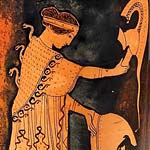
was the great Olympian goddess of wise counsel, war, the defence of towns, heroic endeavour, weaving, pottery and other crafts. She was depicted crowned with a crested helm, armed with shield and spear, and wearing the snake-trimmed aigis cloak wrapped around her breast and arm, adorned with the monstrous head of the Gorgon.
The more famous myths featuring the goddess Athene include:--
- Her birth from the head of Zeus, fully-grown and arrayed in arms;
- Her contest with Poseidon for dominion of Athens in which she produced the first olive tree and he the first horse;
- The War of the Giants in which she buried Enkelados beneath Mount Etna and made her aigis from the skin of Pallas;
- The attempted rape of the goddess by Hephaistos, who spilled his seed upon the earth and produced Erikhthonios, who she then adopted as her own;
- The assisting of Perseus in his quest to slay the Gorgon and the Argonauts in their quest for the Golden Fleece;
- The assisting of Herakles with his twelve labours;
- The weaving contest with Arakhne who was transformed by the goddess into a spider;
The blinding of Teiresias for viewing her naked in the bath; - The Judgement of Paris in which she competed with Hera and Aphrodite for the prize of the golden apple;
- The Trojan War where she sided with the Greeks in battle, but attacked their ships with a storm when they failed to punish Oilean Ajax for violating her Trojan shrine.
This site contains a total of 9 pages describing the goddess, the content of which is outlined in the table below. N.B. The At
[1.1] ZEUS & METIS (Hesiod Theogony 887, 924; Apollodorus 1.20)
[1.2} Born from the head of ZEUS (Hesiod Theogony 887, 924; Apollodorus 1.20, and others)
Apollo
APOLLON (or Apollo) was the great Olympian god of prophecy and oracles, healing, plague and disease, music, song and poetry, archery, and the protection of the young. He was depicted as a handsome, beardless youth with long hair and various attributes including:--a wreath and branch of laurel; bow and quiver; raven; and lyre.
The most famous myths of Apollon include:--
- His birth on the island of Delos;
- The slaying of the serpent Pythonwhich guarded the oracular shrine of Delphoi;
- The slaying of the giant Tityoswho attempted to carry off the god's mother Leto;
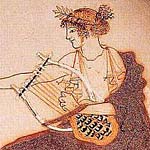
- The destruction of the Niobideswhose mother had offended Leto with her boasts;
- His music contest with the satyr Marsyas who lost and was flayed alive;
- His love for the youth Hyakinthos who was killed by a discus throw and transformed into a flower;
- His love for the nymph Daphne who fled from him and was transformed into a laurel tree;
- His love for Koronis who was slain by Artemis for her infidelity;
- The murder of the Kyklopes who had forged the lightning bolt used to destroy his son Asklepios;
- His service as bondsman to the mortal Admetos;
- His struggle with Herakles for the Delphic tripod;
- The Trojan War in which he brought plague to the Greeks and helped Paris slay Akhilleus.
HMPH - =P
KRONOS (or Cronus) was the Titangod of time and the ages, especially time where regarded as destructive and all-devouring. He ruled the cosmos during the so-called Golden Age, after castrating and deposing his father Ouranos (the Sky). In fear of a prophecy that he would be in turn be overthrown by his own son, Kronos swallowed each of his children as soon as they were born.Rhea managed to save the youngest, Zeus, by hiding him away on the island of Krete, and fed Kronos a stone wrapped in the swaddling clothes of an infant. The god grew up, forced Kronos to disgorge his swallowed offspring, and led the Olympians in a ten year war against the Titanes, before driving them defeated into the pit of Tartaros.
Many human generations later, Zeus released Kronos and his brothers from this prison, and made the old Titan king of the Elysian Islands, home of the blessed dead. Kronos was essentially the same as Khronos, the primordial god of time in the Orphic Theogonies.
I HAVE NO IDEA WHY I PUT KRONOS, BUT HES STILL PART OF GREEK MYTHOLOGY, IF U READ TILL HERE, THAT IS HAHA
heres another olympian as the featured god / hero!
PERSEUS was one of the most celebrated of the Greek heroes. His story was as follows:--Perseus' mother Danae was locked in a bronze chamber by her father Akrisios, where she was impregnated byZeus in the form of a golden shower. Akrisios put both mother and child in a chest and set them adrift in the sea, but they washed safely ashore on the island of Seriphos. Later when Perseus was grown, King Polydektes, command he bring back the head of Medousa. With the help of the gods, Perseus first obtained an invisible helm, magical sword, and winged sandals. He then stole the single eye of the Graiai, three ancient hags, who told him where to find the Gorgones. The hero approached the sleeping Medousa, and beheaded her with eyes turned away, to avoid her petrifying visage. On his way back to Greece, he spied the princess Andromeda chained to the rocks as a sacrifice to a sea-monster. Perseus slew the monster, and rescued the girl, bringing her back to Greece as his bride. On Seriphos, he turned King Polydektes to stone, then travelled to his grandfather's kingdom to claim the throne. The old man fled, and was later accidentally killed by Perseus at some Games with an awry discus throw.
Perseus was the ancestor through his sons and daughter of the royal houses of Mykenai, Elis, Sparta, Messenia, and distant Persia. His most famous descendant of all was Herakles.
ARIADNE was the immortal wife of the wine-god Dionysos. There were several versions of her story. In one, Ariadne, the daughter of King Minos of Krete, assisted Theseus in his quest to slay the Minotaur, and then fled with him aboard his ship. However, when they landed on the island of Naxos, Theseus abandoned her as she was sleeping. It was here that the god Dionysos discovered her and made her his wife. Some say that she was later slain byArtemis, or else granted immortality. In another account, Ariadne's bridal with Dionysos occurred several generations before, when the god was still wandering the earth introducing his cult. But when he rode into battle against the Argives with his band of sea women, she was slain or turned to stone by King Perseus. The god then descended to the underworld through Lerna to bring her back, before ascending to Olympos.
Ariadne was often depicted alongside Dionysos in Greek vase painting: either amongst the gods of Olympos, or in Bacchic scenes surrounded by dancing Satyrs and Maenads. The discovery of the sleeping Ariadne on Naxos was also a popular scene in both vase painting and mosaic....
Read on! Welcome to the site yeah!
|
Charon |
Charon |
| Erinyes | Furiae |
| Hades | Dis, Pluto |
| Hecate | Hecate |
| Persephone | Proserpine Underworld dudes =) |
| PARENTS |
| [1.1] MINOS (Homer Odysseu 11.320, Hesiod Theogony 947, Plutarch Theseus 20.1, Diodorus Siculus 4.61.5, Ovid Metamorphoses 8.175, and others) [1.2] MINOS & PASIPHAE (Apollonius Rhodius 3.997, Hyginus Fabulae 224. Ovid Heroides 4.59) |
| OFFSPRING |
| [1.1] THOAS (by Dionysos) (Quintus Smyrnaeus 4.385, Apollonius Rhodius 4.425, Ovid Heroides 6.114) [1.2] THOAS, STAPHYLOS, OINOPION, PEPARETHOS (by Dionysos) (Apollodorus E1.9) [1.3] OINOPION (by Dionysos) (Anacreon Frag 505e, Diodorus Siculus 5.79.1) [1.4] OINOPION, STAPHYLOS (by Dionysos or Theseus) (Plutarch Theseus 20.1) [2.1] PHLIASOS, EURYMEDON (by Dionysos) (Hyginus Fabulae 14) |
HESTIA was the virgin goddess of the hearth (both private and municipal) and the home. As the goddess of the family hearth she also presided over the cooking of bread and the preparation of the family meal. Hestia was also the goddess of the sacrificial flame and received a share of every sacrifice to the gods. The cooking of the communal feast of sacrificial meat was naturally a part of her domain.
In myth Hestia was the first born child ofKronos and Rhea who was swallowed by her father at birth. Zeus later forced the old Titan to disgorge Hestia and her siblings. As the first to be swallowed she was also the last to be disgorged, and so was named as both the eldest and youngest of the six Kronides. When the gods Apollon and Poseidon sought for her hand in marriage, Hestia refused and asked Zeus to let her remain an eternal virgin. He agreed and she took her place at his royal hearth.
Hestia was depicted in Athenian vase painting as a modestly veiled woman sometimes holding a flowered branch (of a chaste tree ?). In classical sculpture she was also veiled, with a kettle as her attribute.
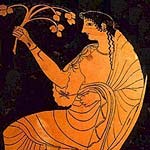
HE′STIA
(Hestia, Ion. Histiê),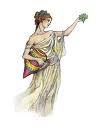
the goddess of the hearth, or rather the fire
burning on the hearth, was regarded as one of the twelve great gods, and
accordingly as a daughter of Cronus and Rhea. According to the common
tradition, she was the first-born daughter of Rhea, and was therefore
the first of the children that was swallowed by Cronus. (Hes. Theog. 453,
&c.; Hom. Hymn. in Ven. 22; Apollod. i. 1. § 5.) She was,
like Artemis and Athena, a maiden divinity, and when Apollo and Poseidon
sued for her hand, she swore by the head of Zeus to remain a virgin for
ever (Hom. Hymn. in Ven. 24, &c.), and in this character it
was that her sacrifices consisted of cows which were only one year old.
The connection between Hestia and Apollo and Poseidon, which is thus
alluded to in the legend, appears also in the temple of Delphi, where
the three divinities were worshipped in common, and Hestia and Poseidon
appeared together also at Olympia. (Paus. v. 26. § 26, x. 5. § 3; Hom. Hymn. xxxi.
2.) As the hearth was looked upon as the sacred centre of domestic
life, so Hestia was the goddess of domestic life and the giver of all
domestic happiness and blessings, and as such she was believed to dwell
in the inner part of every house (Hom. Hymn. in Ven.30; Callim. Hymn.
in Del. 325, in Cer. 129), and to have invented the art of
building houses. (Diod. v. 68; Eustath. ad Hom. p. 735.) In this
respect she appears often together with Hermes, who was likewise a deus
penetralis, as protecting the works of man. (Hom. Hymn. xxxii.
10: Paus. x. 11. § 3.) As the hearth of a house is at the same time the
altar on which sacrifices are offered to the domestic gods (hestiouchoi
or ephestioi), Hestia was looked upon as presiding at all sacrifices,
and, as the goddess of the sacred fire of the altar, she had a share in
the sacrifices in all the temples of the gods. (Hom. Hymn. in Ven. 31.)
Hence when sacrifices were offered, she was invoked first, and the
first part of the sacrifice was offered to her. (Hom.Hymn. xxxii.
5; Pind. Nem. xi. 5; Plat. Cratyl. p. 401, d. ; Paus. v.
14. § 5; Schol. ad Aristoph. Vesp. 842 ; Hesych. s. v. aph
hestias archomenos.) Solemn oaths were sworn by the goddess of the
hearth, and the hearth itself was the sacred asylum where suppliants
implored the protection of the inhabitants of the house. (Hom. Od.xiv.
159; Eustath. ad Hom. p. 1579.) A town or city is only an
extended family, and therefore had likewise its sacred hearth, the
symbol of an harmonious community of citizens and of a common worship.
This public hearth usually existed in the prytaneium of a town, where
the goddess had her especial sanctuary (thalamos), under the name of
Prutanitis, with a statue and the sacred hearth. There the prytanes
offered sacrifices to her, on entering upon their office, and there, as
at a private hearth, Hestia protected the suppliants. As this public
hearth was the sacred asylum in every town, the state usually received
its guests and foreign ambassadors there, and the prytanes had to act
the part of hosts. When a colony was sent out, the emigrants took the
fire which was to burn on the hearth of their new home from that of the
mother town. (Pind. Nem. xi. 1, &c., with the Scholiast;
Parthen. Erot. 18; Dion. Hal. ii. 65.) If ever the fire of her
hearth became extinct, it was not allowed to be lighted again with
ordinary fire, but either by fire produced by friction, or by burning
glasses drawing fire from the sun. The mystical speculations of later
times proceeded from tile simple ideas of the ancients, and assumed a
sacred hearth not only in the centre of the earth, but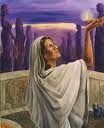
even in that of the universe, and confounded Hestia in various ways with other divinities, such as Cybele, Gaea, Demeter, Persephone, and Artemis. (Orph. Hymn.83; Plut. de Plac. Philos. 3, 11, Numa, 11.) There were but few special temples of Hestia in Greece, as in reality every prytaneum was a sanctuary of the goddess, and as a portion of the sacrifices, to whatever divinity they were offered, belonged to her. There was, however, a separate temple of Hestia at Hermione, though it contained no image of her, but only an altar. (Paus. ii. 35. § 2.) Her sacrifices consisted of the primitiae of fruit, water, oil, wine, and cows of one year old. (Hesych. l. c. ; Hom.Hymn. xxxi. 3, xxxii. 6; Pind. Nem. xi. 6.) The Romans worshipped the same goddess, or rather the same ideas embodied in her, under the name of Vesta, which is in reality identical with Hestia; but as the Roman worship of Vesta differed in several points from that of Hestia in Greece.
Source: Dictionary of Greek and Roman Biography and Mythology
Demeter
goddess
of agriculture, grain, and bread, the prime sustenance of mankind. She
also presided over the foremost of the Mystery Cults which promised its
intiates the path to a blessed afterlife. Demeter was depicted as a
mature woman, often crowned and holding sheafs of wheat and and a torch.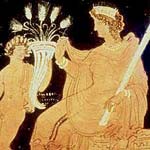
Some of the more famous myths featuring the goddess include:--
- The abduction of her daughterPersephone by Hades, and the great dearth she brought down upon the earth;
- The nursing of Demophoon, the young son of King Keleus of Eleusis;
- The journeys of Triptolemos, a hero sent by the goddess to instruct mankind in agriculture;
- Her assault by Poseidon who forcefully coupled with her in the form of a horse;
- The punishment of Erysikhthon who was cursed with an unquenchable hunger by the goddess for cutting down her holy grove.

DEMETER, one of the great divinities of the Greeks. Tho name Demeter is supposed by some to be the same as gê mêtêr, that is, mother earth, while others consider Deo, which is synonymous with Demeter, as connected with dais and dainumi, and as derived from the Cretan word dêai, barley, so that Demeter would be the mother or giver of barley or of food generally. (Hom. Il. v. 500.) These two etymologies, however do not suggest any difference in the character of the goddess, but leave it essentially the same.
Demeter was the
daughter of Cronus and Rhea, and sister of Hestia, Hera, Aides,
Poseidon, and Zeus. Like the other children of Cronus she was devoured
by her father, but he gave her forth again after taking the emetic which
Metis had given him. (Hesiod. Theog. 452, &c.; Apollod. i.
2. § 1.)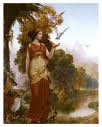
By her brother Zeus, Demeter became the mother of Persephone (Proserpina) and Dionysus (Hesiod. Theoq.912; Diod. iii. 62), and by Poseidon of Despoena and the horse Arion. (Apollod. iii. 6. § 8; Paus. viii. 37. § 6.) The most prominent part in the mythus of Demeter is the rape of her daughter Persephone by Pluto, and this story not only suggests the main idea embodied in Demeter, but also directs our attention to the principal seats of her worship. Zeus, without the knowledge of Demeter, had promised Persephone to Pluto, and while the unsuspecting maiden was gathering flowers which Zeus had caused to grow in order to tempt her and to favour Pluto's scheme, the earth suddenly opened and she was carried off by Aïdoneus (Pluto). Her cries of anguish were heard only by Hecate and Helios. Her mother, who heard only the echo of her voice, immediately set out in search of her daughter.
The spot where Persephone was believed to have been
carried into the lower world is different in the different traditions;
the common story places it in Sicily,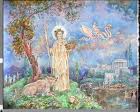
in the neighbourhood of Enna, on mount Aetna, or between the wells Cyane and Arethusa. (Hygin. Fab. 146, 274; Ov.Met. v. 385, Fast. iv. 422; Diod. v. 3; Cic. in Verr. iv. 48.) This legend, which points to Sicily, though undoubtedly very ancient (Pind. Nem. i. 17), is certainly not the original tradition, since the worship of Demeter was introduced into Sicily by colonists from Megara and Corinth. Other traditions place the rape of Persephone at Erineus on the Cephissus, in the neighbourhood of Eleusis (Orph. Hymn. 17.15), at Colonus in Attica (Schol.ad Soph. Oed. Col. 1590), in an island of the Atlantic near the western coast of Spain (Orph. Argon. 1190), at Hermione in Peloponnesus (Apollod. i. 5. § 1; Strab. viii. p. 373), in Crete (Schol. ad Hesiod. Theog. 914), or in the neighbourhood of Pisa. (Paus. vi. 21. § 1.) Others again place the event at Pheneus in Arcadia (Conon,Narr. 15), or at Cyzicus (Propert. iii. 21. 4), while the Homeric hymn on Demeter places it in the plain of Nysa in Asia. In the Iliad and Odyssey the rape of Persephone is not expressly mentioned.
 Demeter wandered
about in search of her daughter for nine days, without taking any nectar
or ambrosia, and without bathing. On the tenth she met Hecate, who told
her that she had heard the cries of Persephone, but did not know who
had carried her off. Both then hastened to Helios, who revealed to them
thai Pluto had been the ravisher, and with the consent of Zeus. Demeter
in her anger at this news avoided Olympus, and dwelt upon earth among
men, conferring presents and blessings wherever she was kindly received,
and severely punishing those who repulsed her or did not receive her
gifts with proper reverence. In this manner she came to Celeus at
Eleusis. As the goddess still continued in her anger, and produced
famine on the earth by not allowing the fields to produce any fruit,
Zeus, anxious that the race of mortals should not become extinct, sent
Iris to induce Demeter to return to Olympus. (Comp. Paus. viii. 42. §
2.) But in vain.
Demeter wandered
about in search of her daughter for nine days, without taking any nectar
or ambrosia, and without bathing. On the tenth she met Hecate, who told
her that she had heard the cries of Persephone, but did not know who
had carried her off. Both then hastened to Helios, who revealed to them
thai Pluto had been the ravisher, and with the consent of Zeus. Demeter
in her anger at this news avoided Olympus, and dwelt upon earth among
men, conferring presents and blessings wherever she was kindly received,
and severely punishing those who repulsed her or did not receive her
gifts with proper reverence. In this manner she came to Celeus at
Eleusis. As the goddess still continued in her anger, and produced
famine on the earth by not allowing the fields to produce any fruit,
Zeus, anxious that the race of mortals should not become extinct, sent
Iris to induce Demeter to return to Olympus. (Comp. Paus. viii. 42. §
2.) But in vain.
At length Zeus sent out all the gods of Olympus to conciliate her by entreaties and presents; but she vowed not to return to Olympus, nor to restore the fertility of the earth, till she had seen her daughter again. Zeus accordingly sent Hermes into Erebus to fetch back Persephone. Aïdoneus consented, indeed, to Persephone returning, but gave her a part of a pomegranate to eat, in order that she might not always remain with Demeter. Hermes then took her in Pluto's chariot to Eleusis to her mother, to whom, after a hearty welcome, she related her fate. At Eleusis both were joined by Hecate, who henceforth remained the attendant and companion of Persephone. Zeus now sent Rhea to persuade Demeter to return to Olympus, and also granted that Persephone should spend only a part of the year (i. e. the winter) in subterraneous darkness, and that during the rest of the year she should remain with her mother. (Comp. Ov. Met. v. 565, Fast. iv. 614; Hygin. Fab. 146.)
Rhea accordingly descended to the Rharian plain near Eleusis, and conciliated Demeter, who now again allowed the fruits of the fields to grow. But before she parted from Eleusis, she instructed Triptolemus, Diocles, Eumolpus, and Celeus in the mode of her worship and in the mysteries. These are the main features of the mythus about Demeter, as it is contained in the Homeric hymn; in later traditions it is variously modified.
HERMES was the great Olympian God of animal husbandry, roads, travel, hospitality, heralds, diplomacy, trade, thievery, language, writing, persuasion, cunning wiles, athletic contests, gymnasiums, astronomy, and astrology. He was also the personal agent and herald of Zeus, the king of the gods. Hermes was depicted as either a handsome and athletic, beardless youth, or as an older bearded man. His attributes included the herald's wand or kerykeion (Latin caduceus), winged boots, and sometimes a winged travellers cap and chlamys cloak.
Some of the more famous myths featuring the god include:--
- The theft of Apollon's cattle which he accomplished as a toddler in the crib;
- The transformation of the tell-tale Battos to stone;
- The slaying of Argos Panohptes, the
hundred-eyed guardian of the nymph Io;
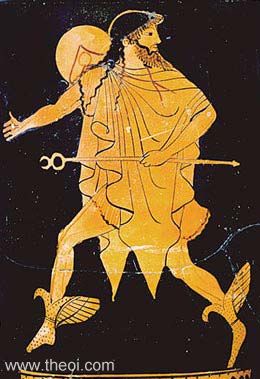
- The assisting of Perseus in the hero's quest to slay Medousa;
- The seduction of Khione on the same night as his brother Apollon;
- The assisting of Odysseus in his encounter with the witch Kirke.
This site contains a total of 13 pages describing the god, including general descriptions, mythology, and cult. The content of the various pages is outlined in the table below. Quotes for these pages are still being compiled (see bottom of this page for the current status of this project).
[1.1] ZEUS & MAIA (Hesiod Theogony 938 &
Astronomy Frag 1, Homeric Hymn 4 to Hermes, Homeric Hymn 17, Alcaeus
Frag 308, Simonides Frag 555, Aeschylus Libation Bearers 683 & Frag
212, Apollodorus 3.112, Philostratus Elder 1.46, Ovid Fasti 5.79)
[1.2] ZEUS (innumerable references)
[2.1] DIONYSOS & APHRODITE (Orphic Hymn 57)
HERMES (Hermês, Hermeias, Dor. Hermas), 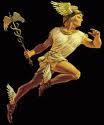 a son
of Zeus and Maia, the daughter of Atlas, was born in a cave of Mount
Cyllene in Arcadia (Hom. Od. viii. 335, xiv. 435, xxiv. 1; Hymn.
in Merc. 1, &c.; Ov. Met. i. 682, xiv. 291), whence he
is called Atlantiades or Cyllenius; but Philostratus (Icon. i.
26) places his birth in Olympus.
a son
of Zeus and Maia, the daughter of Atlas, was born in a cave of Mount
Cyllene in Arcadia (Hom. Od. viii. 335, xiv. 435, xxiv. 1; Hymn.
in Merc. 1, &c.; Ov. Met. i. 682, xiv. 291), whence he
is called Atlantiades or Cyllenius; but Philostratus (Icon. i.
26) places his birth in Olympus.
In the first hours after his
birth, he escaped from his cradle, went to Pieiria, and carried off some
of the oxen of Apollo. (Hom. Hymn. in Merc. 17.) In the Iliad
and Odyssey this tradition is not mentioned, though Hermes is
characterised as a cunning thief. (Il. v. 390, xxiv. 24.) Other
accounts, again, refer the theft of the oxen to a more advanced period
of the life of the god. (Apollod. iii. 10. § 2; Anton. Lib. 23.) In
order not to be discovered by the traces of his footsteps, Hermes put on
sandals, and drove the oxen to Pylos, where he killed two, and
concealed the rest in a cave. (Comp. the different stratagems by which
he escaped in Horn.Hymn. in Merc. 75, &c., and Anton. Lib. l.
c.) The skins of the slaughtered animals were nailed to a rock, and
part of 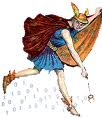 their flesh was prepared and consumed, and the rest burnt; at
the same time he offered scrifices to the twelve gods, whence he is
probably called the inventor of divine worship and sacrifices. (Hom. Hymn.
in Merc.125, &c.; Diod. i. 16.) Hereupon he returned to
Cyllene, where he found a tortoise at the entrance of his native cave.
He took the animal's shell, drew strings across it, and thus invented
the lyre and plectrum. The number of strings of his new invention is
said by some to have been three and by others seven, and they were made
of the guts either of oxen or of sheep. (Hom. l. c. 51; Diod. i.
16, v. 75; Orph. Argon. 381; Horat. Carm. i. 10. 6.)
Apollo, by his prophetic power, had in the meantime discovered the
thief, and went to Cyllene to charge him with it before his mother Maia.
She showed to the god the child in its cradle; but Apollo took the boy
before Zeus, and demanded back his oxen. Zeus commanded him to comply
with the demand of Apollo, but Hermes denied that he had stolen the
cattle. As, however, he saw that his assertions were not believed, he
conducted Apollo to Pylos, and restored to him his oxen; but when Apollo
heard the sounds of the lyre, he was so charmed that he allowed Hermes
to keep the animals. Hermes now invented the syrinx, and after having
disclosed his inventions to Apollo, the two gods concluded an intimate
friendship with each other. (Hom. l.c. 514, &c.) Apollo
presented his young friend with his own golden shepherd's staff, taught
him the art of prophesying by means of dice, and Zeus made him his own
herald, and also of the gods of the lower world. According to the
Homeric hymn (533, &c.), Apollo refused to teach Hermes the art of
prophecy, and referred him for it to the three sisters dwelling on
Parnassus; but he conferred upon him the office of protecting flocks and
pastures (568; comp. Lucian, Dial. Deor. 7; Ov. Met. ii.
683, &c.).
their flesh was prepared and consumed, and the rest burnt; at
the same time he offered scrifices to the twelve gods, whence he is
probably called the inventor of divine worship and sacrifices. (Hom. Hymn.
in Merc.125, &c.; Diod. i. 16.) Hereupon he returned to
Cyllene, where he found a tortoise at the entrance of his native cave.
He took the animal's shell, drew strings across it, and thus invented
the lyre and plectrum. The number of strings of his new invention is
said by some to have been three and by others seven, and they were made
of the guts either of oxen or of sheep. (Hom. l. c. 51; Diod. i.
16, v. 75; Orph. Argon. 381; Horat. Carm. i. 10. 6.)
Apollo, by his prophetic power, had in the meantime discovered the
thief, and went to Cyllene to charge him with it before his mother Maia.
She showed to the god the child in its cradle; but Apollo took the boy
before Zeus, and demanded back his oxen. Zeus commanded him to comply
with the demand of Apollo, but Hermes denied that he had stolen the
cattle. As, however, he saw that his assertions were not believed, he
conducted Apollo to Pylos, and restored to him his oxen; but when Apollo
heard the sounds of the lyre, he was so charmed that he allowed Hermes
to keep the animals. Hermes now invented the syrinx, and after having
disclosed his inventions to Apollo, the two gods concluded an intimate
friendship with each other. (Hom. l.c. 514, &c.) Apollo
presented his young friend with his own golden shepherd's staff, taught
him the art of prophesying by means of dice, and Zeus made him his own
herald, and also of the gods of the lower world. According to the
Homeric hymn (533, &c.), Apollo refused to teach Hermes the art of
prophecy, and referred him for it to the three sisters dwelling on
Parnassus; but he conferred upon him the office of protecting flocks and
pastures (568; comp. Lucian, Dial. Deor. 7; Ov. Met. ii.
683, &c.).
The principal feature in the traditions about Hermes consists in his being the herald of the gods, and in this capacity he appears even in the Homeric poems; his original character of an ancient Pelasgian, or Arcadian divinity of nature, gradually disappeared in the legends. As the herald of the gods, he is the god of skill in the use of speech and of eloquence in general, for the heralds are the public speakers in the assemblies and on other occasions. (Il. i. 333, iv. 193, vii. 279, 385, viii. 517, xi. 684; comp. Orph. Hymn. 27. 4; Aelian, H. A. x. 29; Hor. Carm. i. 10. 1.) As an adroit speaker, he was especially employed as messenger, when eloquence was required to attain the desired object. (Od. i. 38, Il. xxiv. 390; Hom. Hymn. in Cer. 335.) Hence the tongues of sacrificial animals were offered to him. (Aristoph. Pax,1062; Athen. i. p. 16.) As heralds and messengers are usually men of prudence and circumspection,
Hermes was also the god of prudence and skill in all the relations of social intercourse. (Il. xx. 35, xxiv. 282, Od.ii. 38.) These qualities were combined with similar ones, such as cunning both in words and actions, and even fraud, perjury, and the inclination to steal; but acts of this kind were committed by Hermes always with a certain skill, dexterity, and even gracefulness. Examples occur in the Homeric hymn on Hermes (66, 260, 383; comp. Eustath. ad Hom. p. 1337; Hom. Il. v. 390, xxiv. 24; Apollod. i. 6. § 3).
 Being
endowed with this shrewdness and sagacity, he was regarded as the
author of a variety of inventions, and, besides the lyre and syrinx, he
is said to have invented the alphabet, numbers, astronomy, music, the
art of fighting, gymnastics, the cultivation of the olive tree,
measures, weights, and many other things. (Plut.Sympos. ix. 3;
Diod. l.c. and v. 75; Hygin. Fab. 277.) The powers which
he possessed himself he conferred upon those mortals and heroes who
enjoyed his favour, and all who had them were under his especial
protection, or are called his sons. (Od. x. 277, &c., xv.
318, &c., xix. 397; Soph. Philoct. 133; Hes. Op. 67;
Eustath. ad Hom. pp. 18, 1053.)
Being
endowed with this shrewdness and sagacity, he was regarded as the
author of a variety of inventions, and, besides the lyre and syrinx, he
is said to have invented the alphabet, numbers, astronomy, music, the
art of fighting, gymnastics, the cultivation of the olive tree,
measures, weights, and many other things. (Plut.Sympos. ix. 3;
Diod. l.c. and v. 75; Hygin. Fab. 277.) The powers which
he possessed himself he conferred upon those mortals and heroes who
enjoyed his favour, and all who had them were under his especial
protection, or are called his sons. (Od. x. 277, &c., xv.
318, &c., xix. 397; Soph. Philoct. 133; Hes. Op. 67;
Eustath. ad Hom. pp. 18, 1053.)
He was employed by the gods
and more especially by Zeus on a variety of occasions which are
recorded in ancient story. Thus he conducted Priam to Achilles to fetch
the body of Hector (Il. xxiv. 336), tied Ixion to the wheel
(Hygin. Fab. 62), conducted Hera, Aphrodite, and Athena to Paris
(Hygin. Fab. 92; Paus. v. 19. § 1), fastened Prometheus to Mount
Caucasus (Serv. ad Virg. Eclog. vi. 42), rescued Dionysus after
his birth from the flames, or received him from the hands of Zeus to
carry him to Athamas (Apollod. iii. 4. § 3; Apollon. Rhod. iv. 1137),
sold Heracles to Omphale (Apollod. ii. 6. § 3), and was ordered by Zeus
to carry off Io, who was metamorphosed into a cow, and guarded by Argus;
but being betrayed by Hierax, he slew Argus.  (Apollod. ii. 1. § 3.)
From this murder he is very commonly called Argeiphontês. (Il. xxiv.
182; comp. Schol. ad Aeschyl. Prom. 563; Ov. Met. i. 670,
&c.) In the Trojan war Hermes was on the side of the Greeks. (Il. xx.
72, &c.) His ministry to Zeus is not confined to the offices of
herald and messenger, but he is also the charioteer and cupbearer.
(Hom. Od. i. 143, Il. xxiv. 178, 440, Hymn. in Cer. 380;
Eustath. ad Hom. p. 1205.)
(Apollod. ii. 1. § 3.)
From this murder he is very commonly called Argeiphontês. (Il. xxiv.
182; comp. Schol. ad Aeschyl. Prom. 563; Ov. Met. i. 670,
&c.) In the Trojan war Hermes was on the side of the Greeks. (Il. xx.
72, &c.) His ministry to Zeus is not confined to the offices of
herald and messenger, but he is also the charioteer and cupbearer.
(Hom. Od. i. 143, Il. xxiv. 178, 440, Hymn. in Cer. 380;
Eustath. ad Hom. p. 1205.)
As dreams are sent by Zeus, Hermes, the hêgêtôr oneirôn, conducts them to man, and hence he is also described as the god who had it in his power to send refreshing sleep or to take it away. (Hom. Hymn. in Merc. 14, Il. ii. 26, xxiv. 343, &c.)
Poseidon!
POSEIDON was
the great Olympian god of the sea, rivers, flood and drought,
earthquakes, and horses.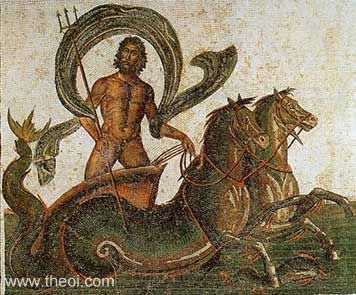
He was depicted as a mature man of sturdy
build with a dark beard, and holding a trident.
Some of the more famous myths featuring the god include:--
- The War of the Titaneswhere he fought beside Zeus and Hades to imprison the old gods in Tartaros;
- The division of the cosmos amongst the sons of Kronos in which he received dominion over the sea;
- The burying of Polybotes beneath the island of Kos in the giant war;
- The sending of a sea-monster to punish the Trojans for refusing to pay him for building their walls;
- The seduction of women such as Tyro, Amymone, Aithra and the Gorgon Medousa;
- His contest with Athena for dominion of Athens in which he produced the first horse;
- The persecution of Odysseus for the blinding of his son the Kyklops Polyphemos.
Artemis Yeah !
ARTEMIS was the great Olympian goddess of hunting, wilderness
and wild animals. She was also a goddess of childbirth, and the
protectress of the girl child up to the age of marriage. Her twin
brother Apollon was similarly the protector
of the boy child. Together the two gods were also bringers of sudden
death and disease--Artemis targetted women and girls, and Apollon men
and boys.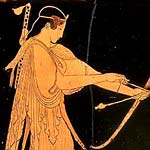
In ancient art Artemis was usually depicted as a girl dressed in a short knee-length chiton and equipped with a hunting bow and quiver of arrows.
Some of the best known myths featuring the goddess include:--
- Her birth, immediately following which she assisted her mother in the birth of her twin brother Apollon;
- The Trojan War where she was beaten by Hera in an angry contest of the gods;
- The hunter Aktaion who encountered the goddess whilst she was bathing and was turned into a stag;
- The Aloadai giants who attempted to storm Olympos but were tricked by Artemis into killing each other;
- The sacrifice of Iphigeneia whom
King Agamemnon offered to her for the passage of the Greek fleet to
Troy;
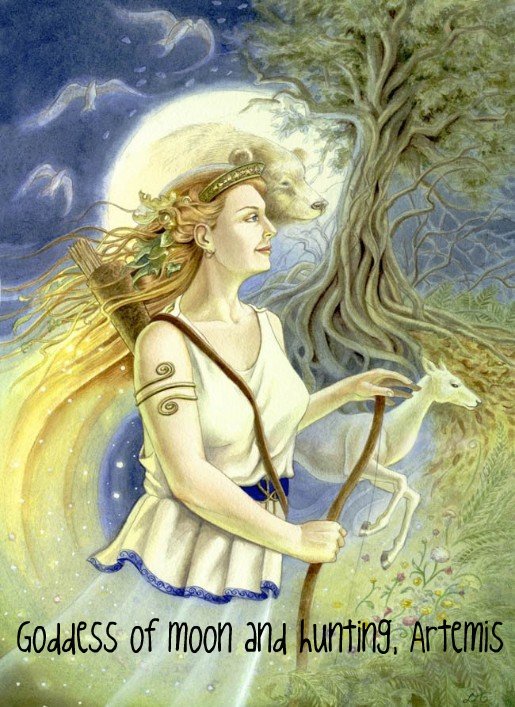

- The giant Orion, a close companion of the goddess, who was slain by the goddess or her jealous brother;
- The Kalydonian boar sent by Artemis to ravage Kaldyon;
- The nymph Kallisto, a companion of Artemis, who was seduced by Zeus in the guise of the goddess.
APHRODITE was the great Olympian goddess of beauty, love, pleasure and and procreation. She was depicted as a beautiful woman usually accompanied by the winged godling Eros (Love). Her attributes included a dove, apple, scallop shell and mirror. In classical sculpture and fresco she was often depicted nude.

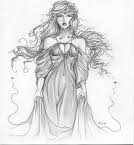
Some of the more famous myths featuring the goddess include:--
- Her birth from the sea foam;
- Her adulterous affair with the god Ares;
- Her love for Adonis, a handsome Cypriot youth who was tragically killed by a boar;
- Her love for Ankhises, a shepherd-prince;
- The judgement of Paris in which the goddess was awarded the prize of the golden apple in return for promising Paris Helene in marriage;
- The Trojan War in which she supported her favourites Paris and Aeneas and was wounded in the fighting;
- The race of Hippomenes for Atalanta, which was won with the help of the goddess and her golden apples;
- The death of Hippolytos, who was destroyed by the goddess for scorning her worship;
- The statue of Pygmalion which was brought to life by Aphrodite in answer to his prayers;
- The persecution of Psykhe, the maiden loved by the goddess' son Eros.
